If thereâs one conclusion to draw from UBCP/ACTRAâs diversity roundtable videos, itâs that no two culturally diverse actors have the same experience navigating the âbiz.
Another conclusion is that, if any real change is to occur â if TV shows and movies are going to prominently and accurately feature diverse actors and stories â these experiences need to be heard, and mulled over, by people in positions of power.
UBCP/ACTRA â thatâs the Union of British Columbia Performers, a branch of the Alliance of Canadian Cinema, Television and Radio Artists â is the screen performersâ union. Its membership includes actors, stunt artists and voice and background performers working the local screen scene.
In the aftermath of social media discussions about onscreen diversity that birthed hash tags such as #OscarsSoWhite and #StarringJohnCho, UBCP/ACTRAâs Diversity and Inclusion Committee took a page from organizations south of the border and hosted a series of diversity roundtable discussions.
The first roundtable â filmed in late 2016 â featured African-Canadian actors and was released to the web a year later (it was hosted by yours truly and is available on YouTube.
The new roundtables feature Vancouver-based Middle Eastern and North African (MENA) and East Asian actors. They were filmed in June 2018 and released in mid-November on YouTube.
The aim of the roundtables is to elevate and amplify underrepresented voices in the Â鶹´«Ã½Ó³»film and TV industry, says Patrick Sabongui, an Egyptian Canadian actor (Homeland, The Flash) and producer, who chairs the Diversity and Inclusion Committee with actress Angela Moore.
âAs diverse actors, we used to sit around on set and have these conversations amongst ourselves,â says Sabongui. âNow these conversations are starting to emanate out into the larger consciousness. Now theyâre including ears and voices that used to not be included.â

Moore agrees, adding that the roundtable discussions were posted online so that anyone in a position to affect change â from studio execs to casting agents to audiences â could benefit from the lived experiences of the participating actors. Ìý
âThis isnât to further the actorsâ profiles,â says Moore. âWhat we tried to do is have a fulsome discussion about some of the challenges that theyâve faced over the course of their careers.â
The diversity roundtables are diverse entities unto themselves. The panelists â Anousha Alamian, Carmel Amit, Michael Benyaer, Medina Hahn, Mozhdah Jamalzadah, Sabongui and Marcus Youssef on the MENA panel, and Benita Ha, Hiro Kanagawa, Thai-Hoa Le, Mayumi Yoshida, Valerie Sing Turner and Raugi Yu on the East Asian panel â represent a range of cultural backgrounds, professional experiences and opinions.
In the videos, that diversity leads to emotional moments where the panelists directly challenge each other. At one point, MENA panelists reflect on how their careers were impacted by 9/11 (one panelist was horrified by the abundance of auditions for terrorist roles that began to come his way, another welcomed the work). In another discussion, a couple of the East Asian panelists disagree as to whether Asians are adequately represented in the film and television sphere.

The panelists also differ when it comes to authenticity, and whether or not they feel a personal responsibility to changing how their cultures are portrayed in screen media.
âItâs not a âthem versus usâ thing,â says Moore. âItâs about educating and challenging and inspiring each other. I think people need to learn how to listen. They did that here.â
Not every actor who was invited to participate in the roundtables welcomed the opportunity to do so.
âSeveral actors and stunt performers would hear me out, and then, after silence and some questions, would say, âI donât think Iâm comfortable talking about this,ââ says Sabongui.
Some of the performers who declined to participate told Sabongui they were worried about being pigeonholed as part of a single cultural group, thus limiting their employment opportunities.
Others worried that participating in a conversation about diversity would invite discrimination, because âtaking a stand for inclusion somehow aligns you with a political group and a political perspective,â says Sabongui. âI think people are hyper-sensitive to becoming part of that debate.â
Regardless, the conversation will continue. UBCP/ACTRA is planning roundtables covering the experiences of LGBTQ, First Nations, disabled and South Asian actors.
âThis is an unfinished project,â says Sabongui. âThis is the beginning of something. There are so many other communities that need to be heard.â
The 2018 UBCP/ACTRA Awards, which honour acting, voice and stunt achievements by UBCP/ACTRA members, will be handed out Dec. 8. The awards arenât broadcast, but follow for red carpet photos and results.
Ìý
Ìý
Ìý
Ìý
Ìý


